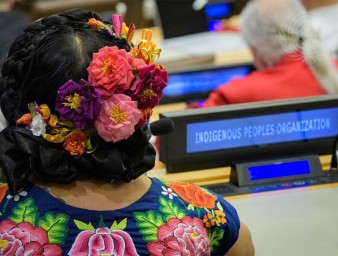Report: Online hate increasing against minorities, says expert
23 March 2021

A new report by the Special Rapporteur on minority issues, Dr Fernand de Varennes, looks at how to address rising online hate speech against minority groups.
Efforts in the fight against "the tsunami of hate and xenophobia in social media" appear to be largely failing, because hate is increasing, not diminishing, according to the Special Rapporteur on minority issues, Dr Fernand de Varennes.
De Varennes was presenting his report on the outcomes of the 13th Forum on Minority Issues to the latest session of the Human Rights Council in Geneva, Switzerland.
In many countries, three quarters or more of the victims of online hate speech are members of minority groups. Women belonging to these groups are disproportionately targeted.
"Too often, hate speech is followed by hate crimes and violence," says de Varennes. "It can too easily prepare the ground for dehumanisation and scapegoating of minorities, and for normalising hate. We need to learn from history and place all our efforts in erasing hate speech from the online space."
The Forum on Minority Issues, an annual event which last year took place virtually due to the pandemic's restrictions, brought together human rights defenders from minority communities, internet companies and social media platforms, non-governmental organizations, States, academics and UN experts for an open and interactive dialogue.
Last year's theme focused on the disturbing and rising occurrence of online hate speech against minorities, and the summary report delivers a range of recommendations.
A call for an international framework driven by human rights
Online hate speech is being addressed by many, however the report highlights the frequent inadequacies of the process. It explains the recurrent inaction, but also action which results in breaches of freedom of expression. The report therefore calls for an 'international regulatory framework' which is centred on, and driven by, the protection and promotion of human rights.
"The current tsunami of hate and xenophobia requires clarity and consistency in guidance, and understanding built upon international human rights law being at the very centre, rather than an afterthought," stated de Varennes, when presenting the report.
Further, an internationally acceptable legal definition of hate speech should be adopted in accordance with international human rights law, particularly on freedom of expression, advises the report.
Prioritising minorities is key
With minorities forming the overwhelming majority of victims of online hate speech, it is crucial that social media platforms prioritise them in consultations in their efforts to address hate speech. States also have a responsibility, says the report, to protect the needs of all minorities, not just some.
When presenting the report, de Varennes recommended that social media platforms must "improve their game" and actively synchronise their community standards with international human rights obligations, particularly to protect minorities. He noted that while moves have begun in this direction, some platforms "invariably seem to ignore or misunderstand what international human rights standards require."
Towards a safer online space for minorities
A zero tolerance policy for hate speech, hate crime and racism against minorities must be adopted by States and tech and social media companies, recommends the report. Rigorous monitoring of hate speech and racism is also a critical requirement.
The report advises that to truly guarantee freedom of expression, and empowerment of members of national, ethnic, religious and linguistic minorities, States need to ensure the Internet and social media platforms represent a safe environment.
"Whole societies are currently being poisoned with misinformation and hate," said de Varennes. "We need to put a stop to this. Everyone must have safe and secure access to social media, with the ability to express themselves, without risking being a victim of discrimination, racism, violence or hostility."
23 March 2021




